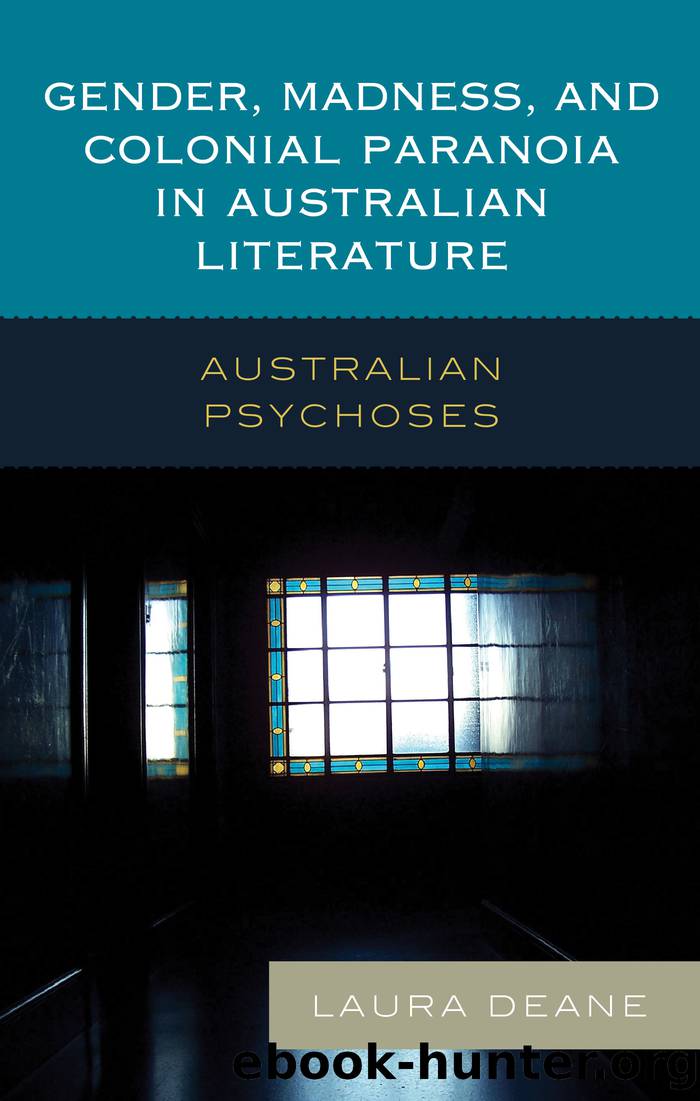Gender, Madness, and Colonial Paranoia in Australian Literature by Deane Laura;

Author:Deane, Laura;
Language: eng
Format: epub
Tags: undefined
Publisher: Lexington Books/Fortress Academic
Published: 2012-08-15T00:00:00+00:00
His embarrassment turns on the notion that sex is one of the âabuses of instinctâ leading to waste of the âfiner feelings, or indiscriminate recourse to members of the other sex, upon which follows venereal diseaseâ (478), and his attempt to explain to Louie that she must not have sex without marriage falters again: âif you must ever go with a man or a boy, LoolooâI leave it to you, it seems inadvisable to meâ (478). The man who engulfs the household with his everlasting talk retreats into a silence that suggests the dimensions of his sexual guilt and shame.
Sam fragments into a psychotic state of dissolution and merging. This is explicit in the closing pages of the novel when he tells Louie: âI am going to watch every book you read, every thought you haveâ (520), so that his policing of her will take on an increasingly telepathic tenor. His inability to distinguish between self and other is suggested in several scenes of merging that signify a psychotic collapse of borders, of structure, and of meaning: the scene where Henny gives birth, but it is Sam who is âred with delight and successâ (303); the scene where he tries to force chewed-up banana into Louieâs mouth (92); and the scene where he insists to Louie: âYou are myselfâ (164). In her analysis of narcissism, Grosz proposes that the narcissist âloves an object according to its resemblance, identity or connection with the self,â[100] and this is apparent in Samâs exhortations that Louie must be like him. Judith Kegan Gardiner has proposed that this is evidence that Sam suffers from a narcissistic personality disorder.[101] However, I go further than Kegan Gardiner to argue that Samâs behavior is more complicated than narcissism, veering into psychosis. His injunction to Louie, âyou and I must cleave togetherâ (479), reveals an incestuous and eroticized desire to obliterate the threat that Louie poses to his own sense of self. The collapse of boundaries by which he correlates Louie to himself attests to a psychotic failure of representation. For Grosz, psychosis involves a âfailureâ in representation and is predicated upon repudiation or foreclosure as a mechanism of psychic defense:
It is a failure to register an impression, involving a rejection of or detachment from a piece of reality [resulting in] the return of the Real that has never been signified [so that] what is internally obliterated reappears . . . in hallucinatory . . . form.[102]
Download
This site does not store any files on its server. We only index and link to content provided by other sites. Please contact the content providers to delete copyright contents if any and email us, we'll remove relevant links or contents immediately.
4 3 2 1: A Novel by Paul Auster(11788)
The handmaid's tale by Margaret Atwood(7446)
Giovanni's Room by James Baldwin(6808)
Asking the Right Questions: A Guide to Critical Thinking by M. Neil Browne & Stuart M. Keeley(5355)
Big Magic: Creative Living Beyond Fear by Elizabeth Gilbert(5350)
Ego Is the Enemy by Ryan Holiday(4954)
On Writing A Memoir of the Craft by Stephen King(4660)
The Body: A Guide for Occupants by Bill Bryson(4580)
Ken Follett - World without end by Ken Follett(4441)
Bluets by Maggie Nelson(4259)
Adulting by Kelly Williams Brown(4231)
Eat That Frog! by Brian Tracy(4147)
Guilty Pleasures by Laurell K Hamilton(4116)
White Noise - A Novel by Don DeLillo(3828)
The Poetry of Pablo Neruda by Pablo Neruda(3813)
Fingerprints of the Gods by Graham Hancock(3731)
Alive: The Story of the Andes Survivors by Piers Paul Read(3728)
The Book of Joy by Dalai Lama(3694)
The Bookshop by Penelope Fitzgerald(3615)
